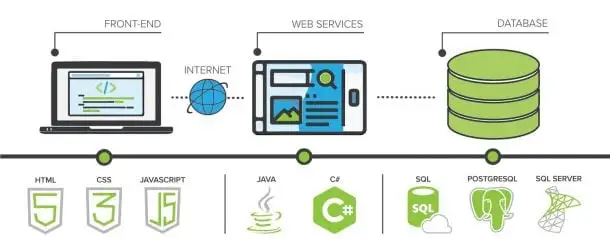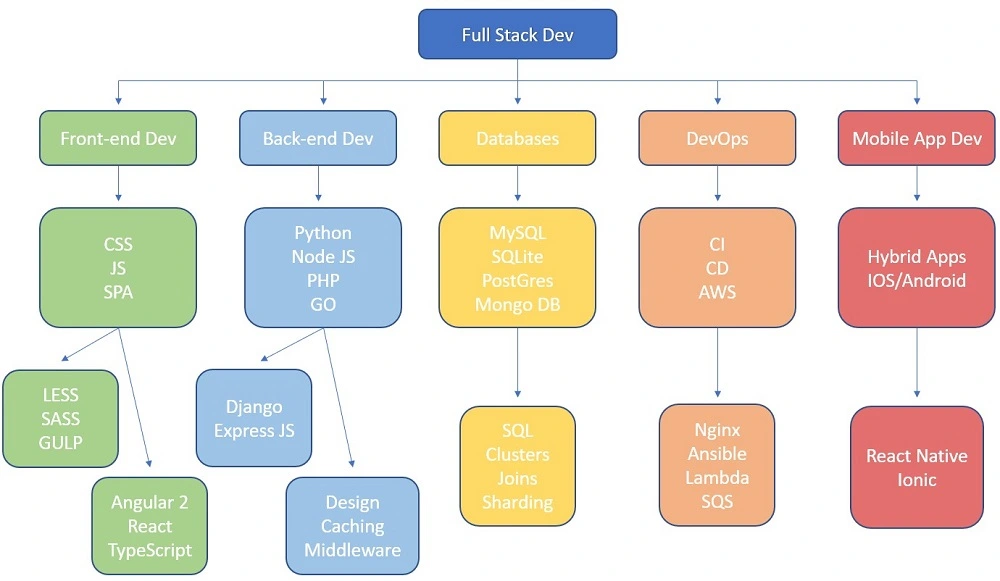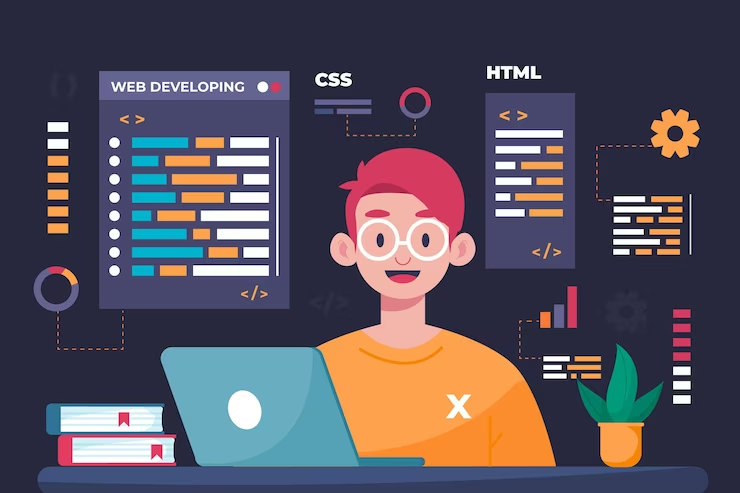Introduction
Do you need help finding the ideal full-stack developer for your team? Look nowhere else! This post will show you how to select and recruit a top-tier full-stack developer who will contribute their knowledge and experience to your business.
We can help you with everything from writing a job description to interviewing. Therefore, keep reading if you’re prepared to hire a full-stack developer who will take your project to the next level.
Greetings, and welcome to our article on finding a full-stack developer! If you’re in charge of a company or group, you’ve likely considered adding a full-stack developer to your staff. This article will offer advice and best practices for locating and hiring the ideal full-stack developer for your requirements.
This book will provide the tools to identify and hire the ideal full-stack developer for your project, whether you’re a small startup trying to build your first web application or a larger firm seeking to enhance your existing software.
Full Stack Developer Salaries world-wide
| Country | Junior Level (0-2 years) | Mid-Level (2-5 years) | Senior Level (5+ years) |
|---|---|---|---|
| USA | $60,000 – $90,000 | $80,000 – $120,000 | $100,000 – $150,000+ |
| UK | £25,000 – £40,000 | £40,000 – £60,000 | £60,000 – £90,000+ |
| Canada | CAD 45,000 – CAD 70,000 | CAD 60,000 – CAD 85,000 | CAD 80,000 – CAD 100,000+ |
| India | INR 400,000 – INR 800,000 | INR 800,000 – INR 1,200,000 | INR 1,200,000 – INR 1,500,000+ |
Explore Remote vs. Local Pay Differences
With the rise of remote work, full-stack developers now have the freedom to work from anywhere, which has influenced salary structures. While developers in countries like the U.S., Canada, and Germany command some of the highest salaries, remote roles offer companies the opportunity to hire talent from more affordable markets. For example, a full-stack developer based in India may earn significantly less than one based in Silicon Valley but still offer top-tier skills.
Freelancers vs. Full-Time Employees
Another factor to consider is the cost difference between hiring freelancers versus full-time developers. Freelancers tend to charge by the hour or per project, with rates ranging from $20 to $150 per hour depending on their location and expertise. Full-time employees, on the other hand, usually come with benefits and job security, leading to long-term stability. However, hiring freelancers may be cost-effective for short-term or one-off projects.
Who is a Full stack developer?
A software engineer with expertise in both front-end and back-end technologies is known as a “full-stack developer”. The phrase “full stack” describes the variety of technologies a developer is knowledgeable with and capable of using, including the front-end and back-end programming that goes into a website or application.
To become a full-stack developer, you must write code connecting numerous software components to create and manage online applications and platforms. Whether it’s full-stack web or mobile app development, collaborating with a MERN stack development company can help you leverage powerful JavaScript-based technologies for fast, scalable, and feature-rich applications.

Implementing user identification, data storage, and security measures also entails working with various programming languages, frameworks, and databases. In addition, full-stack engineers must test and debug their code and collaborate with other team members and stakeholders to ensure the finished product meets the user’s needs.
7 Benefits of Hiring Full Stack Developer for Your Company
Improve efficiency
One of the main advantages of employing a full-stack developer is increasing efficiency. Because they are skilled in all phases, full-stack developers may manage a project’s whole software development process. As a result, they can take on more responsibility and finish tasks more rapidly, which helps speed up teamwork and the release of your program.
Flexibility
Employing a full-stack developer also offers the advantage of flexibility. Full-stack developers can respond to changing needs and requirements by working on both the front-end and back-end development of a website or web development.
This can be extremely helpful if you need to upgrade or improve your current program, have a sophisticated or specialized project, or both.
Cost reduction of full stack web development
Sometimes, your company or organization may save money by hiring a full-stack developer. Because full-stack developers can manage the complete development process, you might be able to reduce the number of specialized web developers you require on your team. This may result in lower training and onboarding expenses in addition to pay and benefit cost savings.
Better Interaction
The ability of full-stack engineers to work well with cross-functional teams is also well known. Since they are skilled in all phases of software development, they can communicate efficiently with designers, project managers, and other stakeholders. This can enhance the entire development process and result in better business outcomes.
Improved Problem-Solving Capabilities
Most full stack developers are renowned for their excellent analytical and problem-solving abilities. They are adept at problem-solving and debugging and can think critically about designing and constructing software.
This can be extremely helpful if you need to upgrade or improve your current program, have a sophisticated or specialized project, or have both front end and back end development skills.
Versatility
One of the main advantages of hiring a full-stack engineer is their versatility. They are skilled in all phases of software development and can handle various issues and requirements. This can be extremely helpful if you need to upgrade or improve your current program, have a sophisticated or specialized project, or both the front end & back end development.
Security Expertise
Full-stack developers are often well-versed in security practices for both the front-end and back-end of an application. This means they can integrate critical security protocols, such as authentication and data encryption, into their code, making your application more robust and less vulnerable to cyberattacks.
Quicker Time to Market
Since full-stack developers can handle both server-side and client-side development, they can accelerate the delivery of features. Instead of having separate teams work on different parts of the application, a full-stack developer can ensure that both sides are developed concurrently, minimizing project timelines.
Streamlined Communication
Having a full-stack developer onboard simplifies communication across teams. They understand both ends of the application and can act as a liaison between back-end engineers, front-end developers, and other stakeholders like designers and project managers. This ability to bridge gaps reduces the chances of misunderstandings and accelerates problem-solving.
Finding the Right Skill Mix
One of the challenges in hiring full-stack developers is finding someone who is equally proficient in both front-end and back-end technologies. Some developers may lean heavily on one side, making it essential to assess their skill set thoroughly. A practical way to do this is by giving technical assessments that test their proficiency in handling full-stack responsibilities, such as building a simple application from scratch.
Assessing Practical Skills
To make sure you’re hiring a skilled developer, set up technical interviews with coding challenges that cover both front-end (e.g., JavaScript, React) and back-end (e.g., Node.js, Python, or Ruby) development. Additionally, ask candidates to walk you through their portfolio and explain the architecture and technologies used in their previous projects.
Mitigating High Turnover
Full-stack developers are in high demand, which means they may move between jobs frequently. To retain your top talent, focus on offering professional growth opportunities, flexible working conditions, and competitive salaries. Additionally, providing them with diverse projects and career advancement within your company can enhance their loyalty.
Hiring In-House vs. Outsourcing to Agencies
In-House Developers
When you hire full-stack developers in-house, you gain direct control over the development process, which is ideal for companies looking for long-term, ongoing projects. You can build a team that understands your company culture and evolves with the product over time. However, the costs associated with in-house hiring—such as salaries, benefits, and overheads—can be high, especially if you’re in a competitive market.
Outsourcing to Agencies
Outsourcing full-stack development to agencies can be more cost-effective and scalable, especially for short-term or complex projects where specialized skills are required. Agencies often offer a wide range of talent and can assemble a team quickly. The downside, however, is that you may have less control over the project’s progress, and communication delays may arise due to time zone differences.
Working in Cross-Functional Teams
A full-stack developer often interacts with various departments like design, marketing, and product management. It’s crucial that they fit culturally within your organization and can easily collaborate across teams. When assessing candidates, look for soft skills such as communication, adaptability, and teamwork, which are essential for success in a collaborative environment.
Roles and Responsibilities of a Full Stack Developer
The Function and Duties of a Full-Stack Engineer
The front-end and back-end of web apps and websites are designed and built by full-stack developers. They use a range of coding languages, frameworks, and technologies to produce useful and aesthetically pleasing software. The following are some specific duties that full-stack developers may have:
- Design and construction of user interfaces
- Establishing and operating databases
- Composing and testing code for a web application’s back end
- Combining front- and back-end components
- Troubleshooting and debugging problems
- Working together with multidisciplinary teams, such as design professionals and project managers
- Upgrading and maintaining current software
In addition to these technical duties, full-stack web developers may also be involved in project management and planning. Before translating those demands into helpful software, they might collaborate with clients to comprehend their objectives and wants.
Documenting their work and updating stakeholders on their progress may also fall under the purview of full-stack professionals.
Qualifications for Full Stack Developers
For their jobs to be practical, full-stack developers need diverse abilities. The following are some essential qualifications and skills for full-stack developers:
- Knowledge of several programming languages, including HTML, CSS, JavaScript, and Python, as well as a working knowledge of front-end frameworks like React or Angular
- Being familiar with back-end technologies like Node.js and Express
- Having SQL and database experience
- Knowledge of agile development techniques
Full-stack professionals should have excellent analytical and problem-solving skills besides these technical ones. They ought to be able to solve problems and exercise critical thought when creating software. As technology and programming languages advance, full-stack engineers should be proactive and eager to learn new things.

When should one hire a full-stack developer?
The following are some reasons one would need a full-stack developer.
When You Need to Create a Website or Web Application
Hiring a full-stack developer is one of the most apparent choices when creating a new web application or web development. Developers who can manage the complete development cycle, from design to programming to testing and deployment, are known as full-stack developers.
They can collaborate with you to comprehend your needs and objectives before converting them into functional software.
When Current Software Needs to Be Upgraded or Improved
If you want to change or improve an existing website or web application, you should work with full-stack development. Full stack developers can help you enhance your program’s functionality and user experience by fixing problems and adding new features.
Additionally, they can aid in your migration to new platforms and technologies as needed.
When Working on a Custom or Complex Project
A full-stack developer may be ideal for a complicated or custom project that demands particular abilities and understanding.
Because they can work on all stages of the software development process, full-stack engineers can tackle various problems and demands. They can also collaborate with you to devise original solutions for particular issues.
When You Have To Move Fast
Sometimes, you might need to act swiftly to start a project. A full-stack developer can be a useful resource in these circumstances.
Also, they can help you move more swiftly and bring your product to market faster since they can manage the full development process.
If You Lack Internal Development Resources
If your company or organization lacks in-house full-stack development resources, hiring a full-stack developer might be a cost-effective approach to acquiring the required expertise. You can hire full-stack developers on a contract basis, allowing you to pay for the required labour. This is particularly helpful if you only occasionally need to develop anything.
One of the best options for hiring Top developers and programmers is to search on Toptal, a marketplace for top Startup developers; top companies and startups choose Toptal Startup freelancers for their mission-critical software projects.
Tips and Tricks for Choosing a Full-Stack Developer in 2024
Use a template for a job description.
A job description template may be useful when hiring a full-stack developer. It can serve as a starting point for your job ad and ensure that you include all pertinent details.A decent job description template will explain the duties and responsibilities, necessary education and training, and any other data that might be pertinent to the position.
Define the Role and Responsibilities Clearly
Establishing the job and duties of the full-stack developer position is critical before you begin the hiring process. This will help you draw in the best applicants and ensure you get a developer who fits well with your group and project.
Include specifics about the knowledge, abilities, and expertise you’re seeking and any particular tools or frameworks needed for the position.
Be Clear in Your Requirements.
Be specific in your job description when describing the qualifications and experience you’re seeking. Removing applicants who don’t fulfil your qualifications will save time while attracting prospects who are a good fit for the position.
Include information on the programming languages, frameworks, and technologies you’re interested in and any required project experience.
Find A Candidate Who Has The Ability To Work Independently.
Because they frequently manage a project’s complete development process, full-stack developers must be able to work autonomously. When interviewing prospects, make sure to seek someone who can work independently and is self-motivated. As part of the hiring process, consider assigning candidates a coding challenge or project to assess their independent skills.
Think about providing a competitive salary and benefits package.
Given the increasing demand for full stack development, you should provide a competitive compensation and benefits package to attract the best candidates. For example like
- Health insurance
- Retirement savings plans
- Paid time off
- Professional development opportunities
When negotiating with applicants with good abilities and expertise, consider setting a wage under industry norms. You could also consider including extra perks like flexible work schedules, remote work possibilities, or chances for training and development.
Full Stack Developers Salaries by Location Worldwide in 2024
Full-stack engineers in bigger cities often make more money since their living costs are greater. The average yearly wage accompanies the following list of cities with the highest salaries:
| City | Average Salary (USD) |
|---|---|
| San Francisco, CA | $144,714 |
| McLean, VA | $138,122 |
| New York, NY | $130,107 |
| Austin, TX | $127,830 |
| Chicago, IL | $126,995 |
| Denver, CO | $120,394 |
| Irving, TX | $119,450 |
| Atlanta, GA | $113,073 |
Full-stack developer salaries by Designation and experience
The quantity of professional experience a full-stack developer has in the US may affect their income. As you get more experience, you’ll probably get promoted, which results in greater pay. The typical income range for full-stack developers is shown below, broken down by job title and years of experience:
| Position | Experience Range | Salary Range |
|---|---|---|
| Full-Stack Developer (0–1 years) | 0–1 years | $61,000–$99,000 |
| Mid-Level Full-Stack Developer | 1–3 years | $67,000–$106,000 |
| Senior Full-Stack Engineer | 4–6 years | $72,000–$113,000 |
| Principal Full-Stack Engineer | 8+ years | $146,000–$248,000 |
| Vice President of Engineering | 8+ years | $227,000–$396,000 |
Never underestimate the importance of cultural fit.
Finding a full-stack developer who is a good fit for your company culture is crucial in addition to looking for someone with the necessary technical knowledge and expertise. Look for a candidate with beliefs and a working style comparable to yours.
A developer who is a good fit for your team is more likely to succeed in their position and contribute favourably to your business.
Conclusion
In conclusion, investing in a full-stack developer might pay off for your company or organization. Full-stack developers are highly skilled professionals adept in all phases of software development, from front-end design to back-end programming.
They are adaptable and capable of managing the full project development cycle, boosting productivity and resulting in cost savings. Full-stack developers are renowned for having excellent analytical and problem-solving abilities, as well as for being able to work well in cross-functional teams.
Follow the advice in this article to select the best full-stack developer for your needs if you’re considering employing one.







